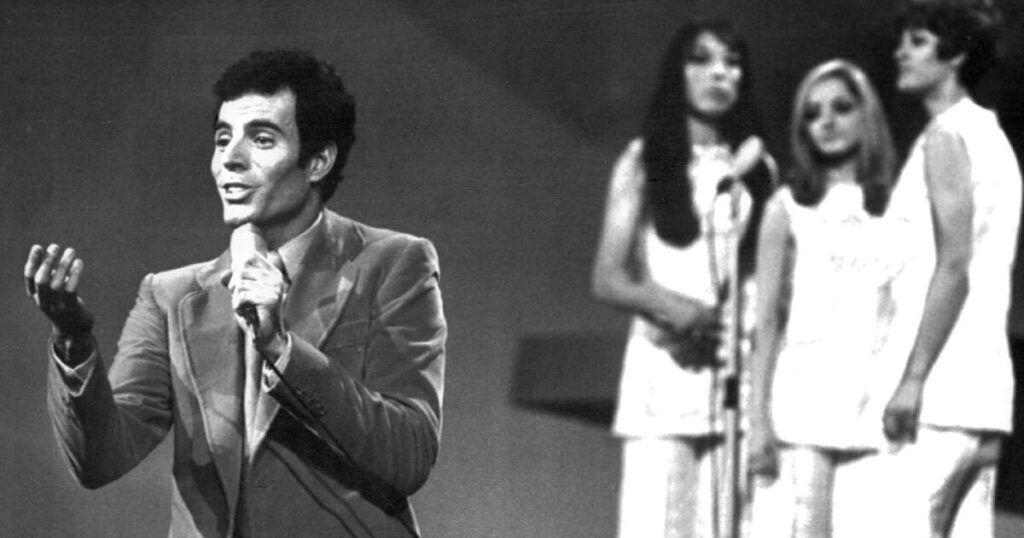
Julio Iglesias sings of the pain of living, and the refrain, like the title, is “Asi nacemos,” thus we are born. The version I listened to one morning this winter, recorded live in Paris in the mid-1970s, was introduced to the audience at the Olympia in a mix of Spanish and French with the comment from Iglesias that he knew from very young where babies come from because his father was a gynecologist. The comment wasn’t particularly clever, but Iglesias’s voice is full of laughter, as if at a shared secret. His audience responded in kind, with a gentle rumble of complicity accumulating and then dissipating as the singer continued speaking. As I listen, I smile too. How can I help it? He’s a charmer, and I fall under his spell even though it is the man heard not seen, speaking to others, not me, in two languages that, although familiar to me, are not mine, and at a distance in years that is even greater than the difference of language and place.
Perhaps part of the joke is that Iglesias has such a reputation as a womanizer. Well of course he knows where babies come from—he’s dedicated much of his life to exploring the portal by which they arrive. But how I love the glad energy of his singing and his songs. Many of these songs are not his except in that, by singing them, he has made them famous. In return, these many songs have made him rich and admired. Cursi, hortera, meaning corny and tacky, are words applied to his songs and his singing. Sentimental, according to some. How can I even tolerate him, much less choose him?
But are his songs so sentimental? “Asi Nacemos,” written by Manuel Alejandro, is anything but. We are born, are the lyrics, with our eyes tightly closed as if sensing the horrible world we’re about to see, a cry on our lips of regret at our arrival, fists clenched, ready to fight, and wrinkled skin like an omen of the day when hard old age will arrive. Nothing warm and comforting there. Several songs before “Asi Nacemos” on the memory stick that I’ve listened to a thousand times, all 26 hours of it, is a song called “Llegamos Tarde los Dos,” which means we both arrived late. And that is the gist of the song, a man lamenting to his beloved that they both arrived late for the meeting of their lives. It’s a common enough sentiment. “If only we’d met before,” or in another life or at a different time. I’ve heard it voiced in a hundred songs and read it in half as many stories. Who can refrain from that kind of dreaming? If only! If only I had known, if only I had seen, if only things had been different. So many small regrets to fill up people’s lives. Songs and stories, I said, but the work that jumped first to mind was a poem, “We met at the end of the party,” by Philip Larkin. It was published posthumously, a fact that makes even more affecting the speaker’s regret for wasted time, for missing out on the excitement and joy of arriving early when all is fresh and time is abundant. Instead, so little time! Still, you might want to break into the poem to remind the speaker that at least they did meet. Better late than never. Better to regret wasted years than a wasted life.
Larkin, like Iglesias, was a womanizer. Or so it is said, though in a letter to The Guardian one reader disputes the characterization. He writes that a man known only to have had six lovers and none of them casual cannot be considered a womanizer. Regardless, Larkin carried on affairs with more than one woman at a time. He loved them. He wrote them poems. He regretted not having more of a good thing. If only.
Instead of wishing for more, it is possible to wish for less. But despite songs like “Hey” and “Ni Tu Gato Gris, Ni Tu Perro Fiel,” meaning not your gray cat, not your faithful dog, both full of reproaches, experience is not something Julio sings of wanting less of. The clenched fists and wrinkled skin of “Asi Nacemos” don’t appear to bother the singing Julio, his voice full of joy. Thus we are born, yes, but look now! And, if you’d never met the other, you’d have no one to address the laments to, and no other eager to console you. In contrast, listen to Larkin, who finds no consolation:
You said: ‘There’s autumn too.’
Always for you what’s finished
Is nothing, and what survives
Cancels the failed, the famished,
As if we had fresh livesFrom that night on, and just living
Could make me unaware
Of June, and the guests arriving,
And I not there.
When you’re on a high, Larkin provides a sobering perspective. But when life is weighing on you, I recommend Julio to show how to enjoy even a lament.


